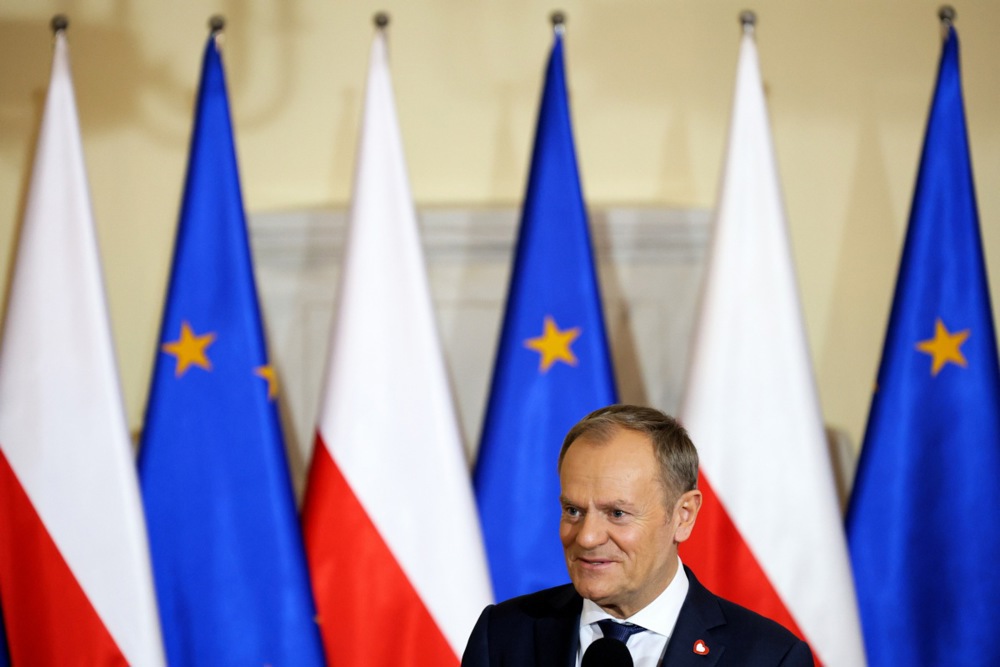The International Press Institute (IPI) joins Media Freedom Rapid Response (MFRR) partners in today renewing our joint call for democratic and comprehensive reform to the Poland’s public broadcasters which creates systematic safeguards to limit the ability of all governments, future and present, to meddle in editorial or institutional independence of the country’s public media.
The MFRR coalition also reaffirms the set of recommendations for steps that can be taken by the new coalition government to improve the wider situation for media freedom and independent journalism in Poland. These recommendations were jointly developed following a recent mission of the MFRR to Warsaw ahead of the election.
Our organisations jointly urge the new Civic Platform-led government to heed the concerns and recommendations of media freedom organisations. We call on political leaders to ensure that all reforms to the media space in Poland – both underway and planned – adhere to democratic values and follow the rule of law.
The call comes amidst an ongoing battle over the future of public broadcaster TVP and Polish Radio. Since coming to power, the new government abruptly dismissed the supervisory bodies of TVP and national news agency PAP and put the public media into liquidation, an unprecedented move which uses a legal loophole to allow the government to continue financing the broadcaster while also making internal changes.
While the new administration has defended the moves as necessary to dismantle the propaganda output of TVP, the former ruling party has criticized the changes as undemocratic and aimed at cementing a new form of political control over the channels.
While the MFRR continues to support much needed reforms by the new coalition government to restore the impartiality, reliability and professionalism of public media in Poland, the means used to do so must be democratic, legal and truly aimed at increasing pluralistic and balanced coverage, prioritizing the public interest over any one political interest.
With a new law on public service media reportedly being developed by the coalition parties, our organizations also call on the new government to conduct a thorough consultative process on any proposed legislative changes, urge that the concerns of the media community are heeded, and stress that reforms are fully in line with the principles outlined in the European Commission’s European Media Freedom Act (EMFA), particularly regarding guarantees for political independence.
Crucially, any reforms by the new government must not perpetuate the cycle of capture and control that was taken to extremes by the Law and Justice (PiS) party during its years in power and ensure that deep structural changes to the management and regulation of TVP and Polish Radio are undertaken which will put an end to repeated periods of politicization after elections.
Given the importance of regulation of public media in Poland, the new administration must address the National Media Council (NMC), which has been identified as a key instrument created by PiS to wield greater control over TVP. The NMC remains an unconstitutional body dominated by PiS appointees and should be addressed under relevant law.
Democratic changes to address the ongoing crisis at public media in Poland are possible, but must be made with restraint and the utmost respect for the rule of law and democracy. The MFRR therefore reasserts the recommendations regarding the future of the public media that were made jointly by our organisations in September 2023 ahead of the election and calls on the new government to carefully consider and implement them. The full MFRR mission report can be read here.
Recommendations
Public service media
– Public broadcasting requires a root and branch reform of both the governance structures and financing mechanism to guarantee political independence and the fulfilling of the public service remit. In particular:
– The appointment process for management and governing bodies must be depoliticised with candidates appointed through transparent, open, and non-discriminatory procedures on the basis of their professional skills and experience with guarantees of political neutrality.
– PSM funding must be conducted through arms-length decision making ideally through a form of TV licensing to ensure that the funds are free of political interference. Any government supplementary allocation should be taken in transparent decision making, that guarantees stable long-term financing, adequate to fulfil the public service mission.
The MFRR mission made further recommendations on wider improvements to the press freedom landscape in Poland.
Media regulation
Media regulators must be able to operate fully independent of government in line with Article 30 of the EU’s Audiovisual Media Services Directive that demands regulators are legally distinct from government and functionally independent of their respective government. Reform of KRRiT should include:
– Depoliticising the appointments process to ensure candidates are appointed through transparent, open, and non-discriminatory procedures on the basis of their professional skills and experience with explicit guarantees of political neutrality.
– Ensuring all processes with respect to licensing and investigations into breaches of the code are subject to clear and transparent procedures and collegiate decision making. Failure to meet those procedures, such as undue delays in licensing decisions, or manifestly politicized investigations, must have clear consequences for those responsible with commensurate compensation provided to the broadcaster affected.
– All decisions must be duly justified in line with the regulatory powers of the office and broadcast code.
– All investigations into alleged breaches of the broadcast code must be conducted by the full board and not placed in the hands of the Chair alone. Investigations should follow due process allowing the accused to present its arguments. Decisions should be accompanied by detailed justifications. There should be an appeals process for condemned media including the option to revisit rulings in the courts in line with European standards of free expression.
– Information should be publicly available on the handling of all complaints received with detailed reports issued at least annually on all decisions with due justification.
Media pluralism
Media pluralism must be ensured through a diverse range of media and owners that operate independently of the state with strong guarantees of editorial independence. Recommended measures include:
– PKN Orlen should be required to immediately divest its media investments and state-controlled companies, outside of the public media framework, should be barred from owning media. – A media plurality test should be developed to measure the impact of transfers of ownership in the media market on pluralism and to guarantee media pluralism.
– The government must guarantee a level economic playing field for all media and end practices that discriminate against, and create a negative investment climate for, private media operating independent of government.
– Media should guarantee minimum levels of editorial independence and ethical standards that protect the newsroom from external interference and ensure journalistic integrity.
State support to media
The discriminatory use of state resources to manipulate the media market must end.
– Public funds and state advertising must be distributed according to transparent, objective, proportionate, and non-discriminatory criteria through open, proportionate, and non-discriminatory procedures.
– Annual reports should be issued on the distribution of all state advertising to media. This should include details of revenue from contracts with state bodies received by companies that belong to the same business grouping as media companies.
– The awarding of all public contracts to companies whose beneficial owners also own media must be subject to particularly careful scrutiny and safeguards to ensure that the awarding of such contracts are not used to influence editorial content of those media.
Vexatious lawsuits
– The judicial appointment procedure must be transparent and independent in practice and in line with European norms and standards.
– The judiciary must be properly trained on the use of strategic lawsuits and mechanisms should be put in place allowing for the early dismissal of evidently vexatious cases and a requirement for claimants to cover the cost of proceedings in such instances.
– Defamation must be decriminalized and become a matter for civil law only. – The government must end the sponsoring of self evidently vexatious lawsuits taken against media or other actors, for legitimate criticism and free expression.
—————-
The MFRR report from September 2023 outlines the full range of challenges facing media freedom in Poland including media pluralism, vexatious lawsuits and safety of journalists. Read the full MFRR mission report here.
Signed:
ARTICLE 19 Europe
European Centre for Press and Media Freedom (ECPMF)
European Federation of Journalists (EFJ)
Free Press Unlimited (FPU)
International Press Institute (IPI)
OBC Transeuropa (OBCT)
The MFRR report from September 2023 outlines the full range of challenges facing media freedom in Poland including media pluralism, vexatious lawsuits and safety of journalists. Read the full MFRR mission report here.
This statement by IPI is part of the Media Freedom Rapid Response (MFRR), a Europe-wide mechanism which tracks, monitors and responds to violations of press and media freedom in EU Member States, Candidate Countries, and Ukraine. The project is co-funded by the European Commission.




